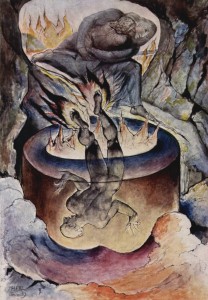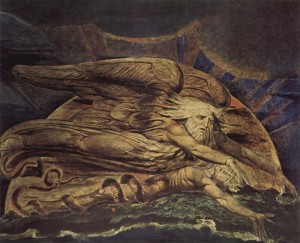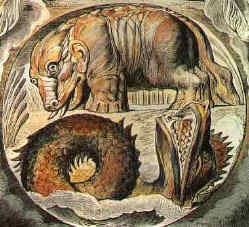Alright, perhaps it is not yet an official holiday (is it?), but November 28th is in fact the anniversary of the death of this remarkable British poet-artist. It has been far too long since I added a meaningful post here; I have been working on a number of new things which have simply not allowed me to get back to my examination of Rorty’s large, but so far quite readable, work.

In the meantime, I have not been dormant. I have taken on a bit of work researching Emmanuel Lévinas. This work has thus far largely been one of data-mining, if you will; little actual reading and interpretation has yet been done, but I have learned or reacquainted myself with the task of journal-finding and sorting. My skills had perhaps become somewhat rusty over the past year, but I also suspect that I had come to expect that my web-searching techniques would work just as well for sorting through piles of academic works. Soon enough, I hope to actually be reading some of these journal articles and books, a task which is understandably more exciting than merely fishing for sources. Since my first experience with Lévinas, I have found some of his ideas to have profoundly altered my perspective, others to seem prima facie contrary to reason, and a number more to simply baffle me. I hope to find more clarity and insight, more explanation for the ostensibly nonsensical, and of course a little footing for the confusing material; of course, I suspect I will just find more material that fits into all three categories.
A number of issues probably made my earlier attempts at following Lévinas’ thought quite difficult, and I suspect that the most salient of these obstacles was my total inexperience with Husserl and Heidegger. I have, since the time of my last writing (over a month ago, it seems) had my first tiny morsels of both of these philosopher’s works. No doubt these little bits are markedly inadequate representations of these two philosophers’ complex perspectives, but I suspect that having a start will help me re-read Lévinas.
In the meantime since my last post, I have also experienced a few more tiny nuggets from philosophers like Michel Foucault, Slavoj Zizek, Roland Barthes, Dietrich Bonhoeffer, Benedetto Croce, Daniel C. Dennett, Francis Bacon, and perhaps a few others whom I cannot now recall. I suspect, though, that the thinker with the most substantial influence on my thought patterns over the past month has been none other than William Blake. Therefore, I mean to take a moment to relax here at home, treating my Black Friday outside as if it were the terror its name implies, while I discuss a bit of the influence of Blake’s ideas.
My standard disclaimer applies; I am interpreting, but as an interested party with limited experience, rather than as an authoritative scholar. I know little about Blake’s life, and have scanned only a few small works of his, so forgive (and correct, point out, or argue against!) my errors and missteps.
I first became interested in William Blake when studying art history. I was struck instantly by Blake’s unusual forms, style, and color in Elohim Creating Adam. This, as so many of his creations, depicted deeply religious images with aesthetic beauty and a seemingly converse, irrepressibly sheol-ic gloom. I saw in Blake’s approach a sort of algedonic theology, maybe even an aesthetic retort to theodicy. The creation of mankind, as an example, is an admixture of good and evil–at least from the standpoint of mankind today. The work is a manner of showing mankind’s ability to get beyond good and evil (see also), without resorting the irreverent self-righteousness of proverbial Tower of Babel architects.

Recently I rediscovered William Blake, this time in the genre of poetry. I am not much of a poetry critic, and quite honestly I have not experienced the same degree of aesthetic ekstasis from his writing as from his art. My approach and my interest is in philosophical ideas, a category of thoughts which exist aplenty in these poems.
One thing that struck me immediately when reading Blake was his similarity to Ralph Waldo Emerson. Both poets have an ostensibly devout affiliation with some form of Christianity, yet each has a fascination with other world religions. Both adopt a pretty revolutionary form of universalism for their time. Blake’s All Religions are One poem/print/argument indicates his position in the least-obscured manner:
The Argument As the true method of knowledge is experiment the true faculty of knowing must be the faculty which experiences. This faculty I treat of. PRINCIPLE 1st That the Poetic Genius is the true Man. and that the body or outward form of Man is derived from the Poetic Genius. Likewise that the forms of all things are derived from their Genius. which by the Ancients was call'd an Angel & Spirit & Demon. PRINCIPLE 2d As all men are alike in outward form, So (and with the same infinite variety) all are alike in the Poetic Genius PRINCIPLE 3d No man can think write or speak from his heart, but he must intend truth. Thus all sects of Philosophy are from the Poetic Genius adapted to the weaknesses of every individual PRINCIPLE 4. As none by traveling over known lands can find out the unknown. So from already acquired knowledge Man could not ac- quire more. therefore an universal Poetic Genius exists PRINCIPLE. 5. The Religions of all Nations are derived from each Nations different reception of the Poetic Genius which is every where call'd the Spirit of Prophecy. PRINCIPLE 6 The Jewish & Christian Testaments are An original derivation from the Poetic Genius. this is necessary from the confined nature of bodily sensation PRINCIPLE 7th As all men are alike (tho' infinitely various) So all Religions & as all similars have one source The true Man is the source he being the Poetic Genius (Be sure to see some original prints of this here.)
It looks like we get to do a little metaphysics before we get the theory of religious/spiritual universalism! Blake is pretty clearly setting up a definition of the self/mind, but it is not clear at first whether this coincides with Cartesian mind/body dualism or not. Most readers would agree that, at the very least, Blake’s “poetic genius” plays a similar role to that of the mind in traditional Cartesian dualist models, because it is both the source of basic inner consciousness and the originator of thoughts. I think that the work also implies that the “poetic genius” is also the recipient of experience (or at the very least, revelation); this “poetic genius” can also be said to be a consciousness of as opposed to simple consciousness, and perhaps a force of reasoning, memory, and other trope mental functions.

However, I think that it is quite unfair say that Blake’s “poetic genius” is simply synonymous with the Cartesian mind; a few important considerations illustrate that this would be an oversimplification. First, even if it is only a matter of emphasis, Blake uses the term “poetic genius” place weight on the role of creativity being at the heart of the human being, rather than our gamut of cognitive functions and perceptions. Blake’s education would have ensured that he knew of the term poet in its original Greek sense; the poet (???????) is not simply “creative” (a term by which we typically indicate “original” thought) but an actual force of creating, a maker. Likewise, the term genius, which to us now implies only high-level cognition, would have been known to Blake also with its Latin connotations; in this case, not simply excellent mental performance, but a sort of spiritual auspice for the individual. Thus the poetic genius is not just a source of unique thought, but an active participating spirit in the world A second consideration to note is the mind/body interaction model supplied by Blake. While it is unclear in this work1 whether the “poetic genius” and our physical bodies are made up of the same metaphysical stuff, Blake is unequivocal in declaring that the outward body is derived from the core, the poetic genius. By then associating the poetic genius with that which “by the Ancients was call’d an Angel & Spirit & Demon”, Blake could be saying that the poetic genius is the incorporeal “mental” “spirit”, but he could also just mean that people formerly described features of the poetic genius in erroneous ways. The middle-way interpretation which I think yields the most interesting results is that Blake is attempting to get beyond the corporeal/incorporeal distinction at this point. By providing a metaphysical structure which allows not only simple mind/body-like interaction but also posits the excressence of the traditionally material from the stereotypically nonmaterial, Blake critiques this metaphysical distinction.
It is important to observe, though, that Blake still appeals to a metaphysical ideal–that the poetic genius is the “true” man; additionally, he offers another grand metaphysical ideal in the form of the universal poetic genius, which of course has implications for a possible hierarchy of metaphysical relationships between the self-ideal of the poetic genius and inter-poetic genius relationships. Unfortunately, I never managed to get beyond the metaphysics to my main point about correlations between Emerson and Blake on topics like universalism, human creativity, and freedom (and, on reflection I think there’s an interesting correlation to flesh out between Blake and symbolists like Stéphane Mallarmé). Perhaps the point is already becoming clear, but if I get the chance I might make another quick post about this topic. I’ll make no promises this time, though, as that seems a sure-fire way to keep me from completing any post.
By the way, in the last month I have also had the unfortunate experience of rediscovering Librarything.com, a place for bibliophiles such as myself to waste their time online. If you are likewise afflicted, I invite you to look me up there by my username “jxn”.
- Blake makes a pretty clear, distinct argument for metaphysical monism elsewhere, but curiously continues to use dualist body/spirit imagery in many other works, perhaps just to confuse folk like myself ↩